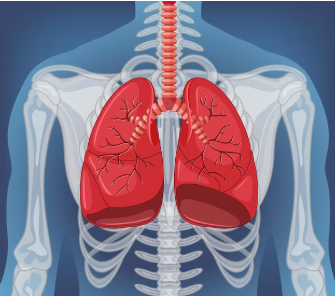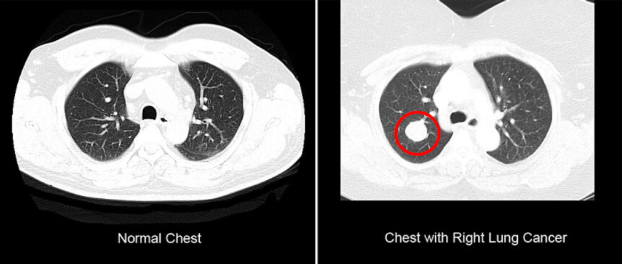By: Geraldus Sigap
Lung cancer is one of the most common and deadly cancers worldwide, but the good news is that it can be prevented or caught early with modern medical tools like a CT scan. The lungs are vital organs responsible for supplying oxygen to the body, and keeping them healthy is essential for overall well-being. However, lung cancer often develops without noticeable symptoms until it has advanced, making early detection crucial. A CT scan, a quick and non-invasive imaging test, offers a way to detect lung cancer in its earliest stages, giving patients the best chance of successful treatment.

Lung cancer is particularly dangerous because it often goes unnoticed in its early stages. Symptoms like persistent coughing, chest pain, or shortness of breath usually appear only when the cancer has progressed. By the time symptoms arise, treatment options may be limited, and outcomes less favorable. This is where CT scans play a lifesaving role.
A CT scan, or computed tomography scan, is an advanced imaging test that uses X-rays to create detailed pictures of the inside of the body. Unlike regular chest X-rays, which provide a flat image, CT scans offer a more detailed, three-dimensional view of the lungs. This allows doctors to identify small abnormalities, such as nodules or tumors, that may not be visible on standard X-rays.

Figure 1. Normal and lung cancer CT scan
CT scans do not prevent lung cancer in the traditional sense, but they play a crucial role in early detection, which can significantly improve survival rates. Early-stage lung cancer is often treatable and curable, whereas advanced-stage lung cancer is more challenging to manage. By identifying cancer in its earliest stages, CT scans allow for prompt intervention, such as surgery, radiation, or targeted therapies.
In addition to detecting cancer, CT scans can also reveal other lung conditions, such as infections, scarring, or chronic obstructive pulmonary disease (COPD). These findings can help patients and doctors address underlying issues and improve overall lung health.
CT scans are not for everyone but are particularly recommended for individuals at higher risk of developing lung cancer. According to medical guidelines, those who may benefit from lung cancer screening include:
- Current and Former Smokers: Smoking is the leading cause of lung cancer, and people with a history of heavy smoking are at the highest risk. A CT scan is especially recommended for individuals aged 50 to 80 who have smoked a pack of cigarettes daily for 20 years or more, even if they quit smoking in the last 15 years.
- People with a Family History of Lung Cancer: Genetics can play a role in cancer risk, so individuals with a close family member who has had lung cancer may consider screening.
- Individuals Exposed to Harmful Substances: People who have been exposed to asbestos, radon gas, or other carcinogens in their workplace or environment may benefit from regular lung health checks.
- Non-Smokers with Respiratory Symptoms: While less common, non-smokers can also develop lung cancer. Persistent symptoms like coughing, wheezing, or difficulty breathing should prompt a discussion with a doctor about the need for a CT scan.
While a CT scan is a powerful tool for lung cancer detection, it is only one part of maintaining lung health. Regular health screenings, including blood tests, physical exams, and discussions about lifestyle factors, can provide a more comprehensive view of overall health. Lifestyle changes, such as quitting smoking, exercising regularly, and avoiding exposure to air pollution, are also critical for preventing lung cancer and other respiratory conditions.
It is worth mentioning that conditions like inflammatory bowel disease (IBD) can also have implications for lung health. While IBD primarily affects the digestive system, it is associated with systemic inflammation that can impact the lungs. Regular check-ups with a doctor can help identify and manage these connections, ensuring that all aspects of health are addressed.
At RS Abdi Waluyo, we are committed to providing world-class care for your respiratory health. Our internal medicine specialists offer comprehensive lung cancer screening services, including low-dose CT scans, to help detect issues early and provide timely intervention. With advanced technology and a patient-centered approach, we ensure that each individual receives accurate diagnoses and personalized care.
Our team of experts works closely with patients to develop tailored prevention and treatment plans, addressing not only lung health but overall well-being. Whether you are at risk for lung cancer, experiencing respiratory symptoms, or seeking preventive care, RS Abdi Waluyo is here to support you every step of the way.
Resources
- Lung cancer screening (low-dose CT) – UF Health Jacksonville [Homepage on the Internet]. [cited 2024 Nov 26];Available from: https://ufhealthjax.org/conditions-and-treatments/lung-cancer-screening-low-dose-ct
- Siddiqui F, Vaqar S, Siddiqui AH. Lung Cancer [Homepage on the Internet]. In: StatPearls. Treasure Island (FL): StatPearls Publishing, 2024 [cited 2024 Nov 26]; Available from: http://www.ncbi.nlm.nih.gov/books/NBK482357/
- Lung cancer – Symptoms and causes – Mayo Clinic [Homepage on the Internet]. [cited 2024 Nov 26];Available from: https://www.mayoclinic.org/diseases-conditions/lung-cancer/symptoms-causes/syc-20374620
